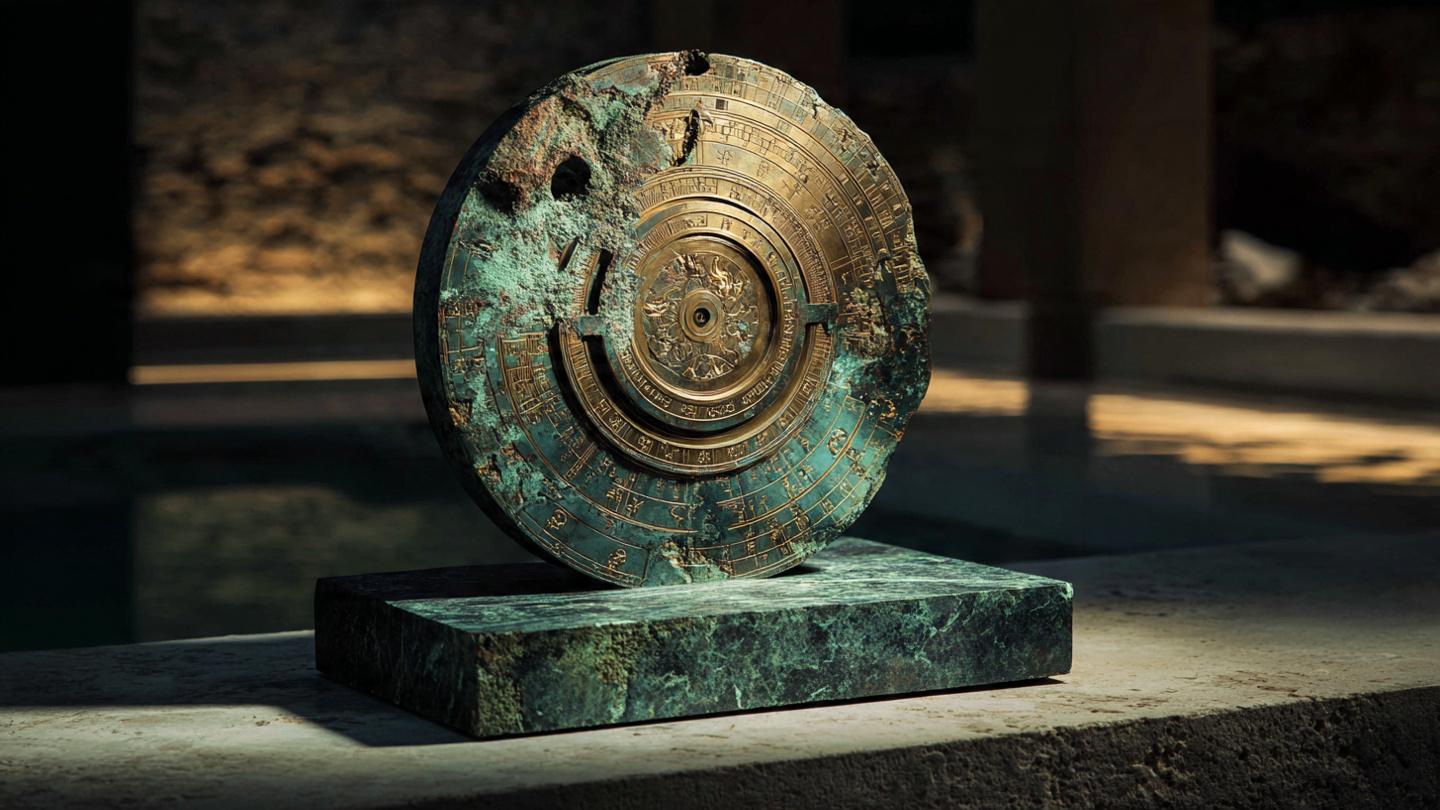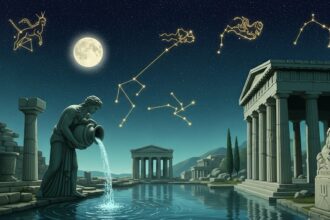In 1901, sponge divers off the rugged shores of Antikythera hauled up a barnacle-crusted lump of bronze from a sunken Roman ship, a relic so extraordinary it compelled historians to overhaul the narrative of technological evolution. This was no ordinary artifact: the Antikythera Mechanism, a 2nd-century BC marvel of interlocking gears, served as the ancient world’s first analog computer, meticulously tracking planetary orbits, lunar phases, solar eclipses, and even the quadrennial rhythm of the Olympic Games. Over two millennia later, its intricate design continues to ignite modern Greek innovation, fusing Hellenistic precision with cutting-edge digital tools to redefine travel, sustainability, and discovery across the Aegean.
In an era dominated by smartphones and AI assistants, the Antikythera Mechanism reminds us that true brilliance doesn’t need batteries. Crafted around 150-100 BC, possibly by the legendary Hipparchus or his contemporaries, this device encapsulated the Hellenistic world’s obsession with order amid chaos. Its 30-plus interlocking gears—some as fine as a wristwatch’s—simulated the irregular orbits of planets, the lunar calendar’s quirks, and the Metonic cycle for eclipse predictions. Historians once dismissed the Greeks as philosophers more than tinkerers, but this find shattered that myth, proving ancient Greek ingenuity rivaled the Renaissance. Today, as Greece emerges as a hotbed of digital disruption, the Mechanism’s legacy fuels everything from sustainable tourism apps to AI-driven vineyards. And for those plotting a Greek escape, it charts a path through must-see spots that honor the past while embracing the future, think private yacht hops to rocky isles and starlit dinners at tech-infused estates.
But why does a 2,000-year-old gadget still captivate? Because it embodies the Greek soul: a relentless drive to decode the divine through human hands. As you sip ouzo overlooking the Aegean, pondering the Mechanism’s dials, you’ll feel that same curiosity stirring, urging you to explore the vibrant innovators redefining what it means to be Greek today.
The Enigmatic Depths: Unearthing the Antikythera Mechanism’s Hidden Marvels
A Chance Find in the Shadow of Titans
It’s October 1901, and a crew of weathered divers, chasing sponges amid the perilous straits near Antikythera, nets a cargo of marble statues from a sunken Roman ship. Amid the haul, a corroded lump catches the eye—barnacle-encrusted bronze, about the size of a shoebox. Back in Athens, scholars like Valerios Stais poked at it with curiosity, only to reveal a labyrinth of toothed wheels that baffled the best minds. What they held was no mere ornament; it was the Antikythera Mechanism, a shipwreck survivor from around 70 BC, likely en route from Rhodes to Rome as a gift for some elite patron.

Fast-forward to the 21st century, and technology has peeled back its layers like an onion of wonders. X-ray tomography in the early 2000s, led by teams from UCL and the Athens National Archaeological Museum, exposed inscriptions in ancient Greek—pointers to zodiac signs, saros cycles, and even the risings of Egyptian gods like Sirius. Ongoing scans with advanced muon radiography (borrowed from particle physics) have hinted at lost components, suggesting the device once included a parallax correction for the sun’s apparent motion. It’s not just gears; it’s a symphony of epicyclic trains, including the world’s oldest known differential gear, allowing it to track multiple cycles independently. This demanded mastery of Babylonian astronomy, Pythagorean math, and Archimedean mechanics, all fused into a portable predictor of cosmic drama.
What the Mechanism Reveals About Lost Knowledge
The Mechanism unmasks a forgotten network of knowledge hubs. Rhodes, its probable birthplace, buzzed with scholars like Posidonius, who blended Stoic philosophy with practical astronomy. The device’s front dial mirrored a geocentric cosmos—sun, moon, and five known planets whirling in bronze harmony—while the back tracked four-year Olympiad cycles, down to victory odes for chariot races. Inscriptions even nodded to the ancient Nemean and Isthmian games, tying celestial math to human triumph.
Critics once argued it was a one-off fluke, but parallels emerge in texts like Cicero’s praise for Archimedes’ sphere or Vitruvius’ water clocks. 3D-printed replicas—crafted via crowdsourced scans from the Antikythera Mechanism Research Project—let enthusiasts crank their own eclipses at home. These models underscore a humbling truth: the Greeks didn’t just theorize; they engineered solutions that anticipated Newton’s laws by 1,800 years. This revelation reframes Greek ingenuity not as myth, but as a blueprint for resilience—much like how today’s Athenians rebound from economic tremors with blockchain ventures.
As travelers, we chase echoes of this era, from cliffside hikes tracing Hipparchus’ observatories to cocktail hours debating if aliens built it (spoiler: they didn’t). The Mechanism doesn’t just rewrite textbooks; it reignites wonder, urging us to see Greece as a living lab of ideas.
Forged in Divine Fire: Hephaestus and the Mythic Roots of Greek Craft
The Lame God Who Shaped the Stars
No tale of ancient Greek ingenuity skips Hephaestus, the volcanic deity of forge and fire, whose hammer strikes echo in every gear of the Antikythera. Born of Hera alone (or Zeus and Hera, depending on the myth), he tumbled from Olympus in a fit of divine domestic drama, landing on Lemnos with a limp that fueled his genius. Undeterred, Hephaestus built an underwater palace of gold automatons—self-pouring goblets and tripod tables that trundled to council meetings—proving that adversity births innovation.

Homer’s Iliad immortalizes him crafting Achilles’ shield: a microcosm of the world in hammered bronze, etched with stars, seas, and sieges. This wasn’t whimsy; it symbolized Greek engineering as storytelling, tools that didn’t just function but evoked the cosmos. Hephaestus’ wife, Aphrodite, adds irony: beauty born of utility, much like the Mechanism’s elegant dials hiding brute mathematical force. Temples to him dotted volcanic isles like those in Athens’ Agora, where artisans prayed for steady hands on lathes that prefigured the Mechanism’s precision.
In mythology’s weave, Hephaestus embodies philia for the machine, a love affair with making that transcended gods and mortals. His forges, belching smoke from Etna’s belly, mirrored the alchemical quest to tame chaos, much as the Mechanism tamed erratic heavens.
Echoes in Eternity: How Hephaestus Inspires Tomorrow’s Makers
This mythic DNA didn’t rust away. From Byzantine watermills to Ottoman astrolabes, Greek craft evolved, but the 19th-century industrial lag couldn’t erase it. Enter 2025’s renaissance: Greek makerspaces in Thessaloniki pulse with Hephaestus’ fire, where 3D printers hum beside traditional coppersmiths. Startups like those in the Athens Tech Hub draw on this lore, designing drones that mimic ancient kites for olive grove surveys—blending forge-god grit with silicon smarts.

For the culturally attuned visitor, invoking Hephaestus turns a ferry ride into ritual. Toast him at a Lemnos winery, where geothermal soils yield volcanic vintages, or wander Hephaestus’ forge-temple ruins, pondering how his automatons foreshadowed the Mechanism’s self-regulating gears. It’s a reminder that Greek ingenuity thrives on narrative—stories that make the mechanical magical, inviting us to craft our own legacies amid olive groves and azure waves.
Gears in Motion: Modern Greek Innovation Reviving Ancient Brilliance
MarTech Mastery: Personalizing the Paradise of Travel
Just as the Antikythera Mechanism crunched cycles to predict perfect game days, today’s Greek tech innovation in MarTech (Marketing Technology) anticipates your wanderlust. Picture algorithms sifting petabytes of data to curate bespoke Aegean itineraries, sunset sails timed to lunar phases, or hidden tavernas matching your palate via AI taste profiles. Companies like TravelPlanet24, a Greek powerhouse, leverage machine learning for dynamic pricing that keeps luxury accessible, echoing the Mechanism’s economical elegance in bronze.
Nowadays, with overtourism straining Santorini’s calderas, MarTech steps up: VR previews of crowded sites via apps from Hellas Direct, or blockchain-verified eco-certifications ensuring your villa stay supports local conservation. For some guests, this means hyper-personalized arrivals—drones delivering welcome hampers synced to your flight, all powered by homegrown code that honors data as the new stars.
FinTech Frontiers: Safeguarding the Seamlessness of Sojourns
Commerce coursed through ancient veins like the Piraeus ports, where ledgers tracked trireme trades with Babylonian precision. Fast-forward, and Greek FinTech channels that meticulousness into bulletproof digital wallets. Viva Wallet, Europe’s fintech darling born in Athens, processes billions in transactions with quantum-resistant encryption—vital for the contactless splurges of island-hopping elites.
Amid crypto’s wild ride, Greek innovators like Raindrop.io pioneer DeFi tools for travelers: instant cross-border payouts for yacht charters, or NFT-gated access to exclusive Mykonos clubs. It’s Hephaestus’ shield reborn—guarding your euros while unlocking doors. Security isn’t afterthought; it’s the forge that tempers trust, letting you focus on the feta, not the fine print.
AgriTech Harvests: Sowing Sustainability in Sacred Soils

The Mechanism’s eclipse dials once guided sowing under favorable moons; now, Greek AgriTech does the same with satellite smarts. Firms like Agroknow in Crete deploy IoT sensors across olive orchards, predicting droughts with 95% accuracy via AI models trained on millennia of terroir data. This sustains the golden liquid that graces your resort breakfasts, cutting water waste by 30% in Thessaly’s thirsty plains.

In today’s climate crunch, innovations like vertical farming pods from Athens-based UrbanFarms yield year-round herbs for Porto Carras’ kitchens, slashing carbon footprints. Grapevines in Nemea, ancient as Dionysus’ revels, now thrive on drone-mapped nutrients—ensuring the Assyrtiko you savor bursts with volcanic vitality. It’s practical poetry: tech that nourishes body and earth, turning every meal into a nod to ancient Greek ingenuity.
Journeys Etched in Bronze and Bytes: Destinations Where History Computes Adventure
Antikythera: Whispers from the Wreck
Your odyssey starts small but seismic: Antikythera, a speck of 24 souls where the Mechanism slumbered. This rugged outpost, ringed by sheer cliffs and goat paths, demands a private caïque from Kythera—two hours of spray-kissed solitude. Hike to the cave-strewn coast where divers struck gold, then picnic amid wild thyme, imagining Roman galleys groaning under statue loads. No glitzy hotels here; it’s raw reflection, best as a day trip prelude to Athens’ polish. For the bold, stargaze under unpolluted skies, gears of memory turning as meteors streak— a living eclipse predicted by antiquity’s hand.

Athens: The Eternal Algorithm of Intellect
Athens pulses as the cradle where philosophy met prototype. Anchor your trip at the National Archaeological Museum, where the Antikythera Mechanism gleams in climate-controlled reverence—its fragments backlit like a relic from Da Vinci’s dreams. Audio guides narrate its secrets in VR overlays, but elevate with a private curator tour, tracing gears to Plato’s Academy ruins nearby.
Beyond marble, dive into the now: The Athens Digital Lab in Plaka buzzes with coders hacking sustainable urban models, while startup meetups at Impact Hub let you grill founders on blending AI with agora vibes. Dine at tech-infused spots like Nolan, where molecular mixology nods to alchemical forges. Athens isn’t split epochs; it’s a seamless script—Acropolis sunrises yielding to Syntagma hackathons, all woven into Olympus Estate.com’s curated escapes.
Thessaly: Mythic Mountains and Maker Plains
Northward, Thessaly unfurls where Olympus broods, home to gods and gears alike. Ascend to Meteora’s clifftop monasteries—eagle’s nests of sandstone prayer, hewn by monk-engineers centuries ago. Cable cars whisk you skyward, but hike the hidden trails for solitude, pondering how hermits’ pulley systems prefigured the Mechanism’s differentials.
Descend to the plains, Thessaly’s unsung innovation belt: Factories in Volos churn AgriTech for global export, while boutique distilleries like those in Trikala use spectral analysis for tsipouro purity. Link it to myth—visit Zeus’ mythical throne sites, then tour a winery where robots prune vines under Mount Olympus’ gaze. It’s terrestrial theater: ancient altars beside solar-powered presses, crafting a narrative stay that feels divinely downloaded.
Porto Carras Grand Resort: Where Luxury Laps at Legacy
In Halkidiki’s emerald embrace, Porto Carras stands as Greek hospitality‘s crown jewel, a 45-square-kilometer idyll of vineyards, marinas, and meltemi breezes. Pioneered in the ’70s with engineering feats like man-made lagoons, it now integrates smart tech seamlessly: AI sommeliers at wine tastings suggest pairings from 500,000-bottle cellars, while yacht apps forecast winds with Mechanism-like prescience.
Spa rituals draw on thermal springs, echoing Hephaestus’ hot forges, and golf courses undulate like epic waves. For families or romantics, it’s the pinnacle, private beaches for Mechanism musings, evenings where firefly drones light beachside feasts, elevating the ordinary to Olympian, proving luxury thrives on ingenuity’s edge.
Phronesis: The Practical Wisdom That Powers Progress

At its core, the Antikythera Mechanism isn’t about wizardry, it’s phronesis, Aristotle’s art of wise action. This virtue bridged theory and forge, urging Greeks to build what mattered: aqueducts for thirsty cities, theaters for communal catharsis, gears for grasping the ungraspable. Phronesis demanded judgment, knowing when math metends, like dialing in an Olympiad to rally a polis.
At present Greece, this shines through: Tech hubs prioritize ethical AI for tourism equity, not just profit—apps that boost rural economies via homestay bookings, or FinTech that includes unbanked islanders. It’s wisdom wrought daily, from Larissa labs optimizing bee pollination to Chania coders gamifying heritage trails.
For you, the worldly wayfarer, phronesis transforms Greece from postcard to pilgrimage. It’s the quiet calculus of choosing a sunset hike over a lounge chair, or chatting with a vintner about drone vintages. Engaging this heritage books epiphanies, where past predictions illuminate present paths.
In the end, the Antikythera Mechanism is the heartbeat of a nation forever fiddling with fate’s dials. As you chart your Greek chapter, let its gears grind inspiration, reminding us that the stars, like stories, yield to those who dare to turn the crank.






















